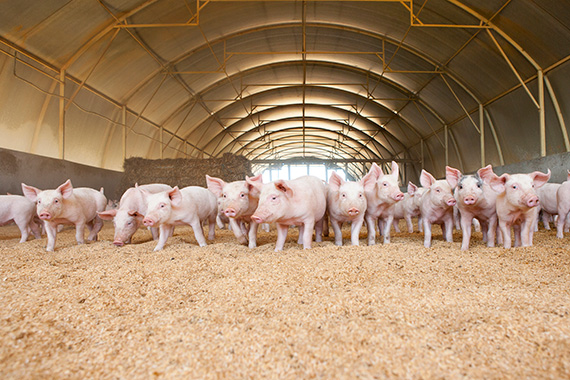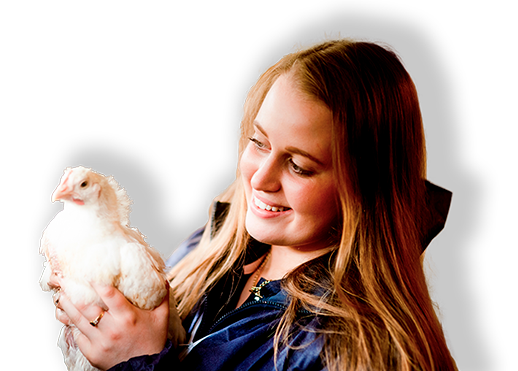Housing and Biosecurity
JBS prioritizes animal health and welfare by aiming to provide comfortable and secure housing that meets or exceeds industry standards.
Across our poultry, beef, pork, and aquaculture operations, our facilities are designed to meet the unique needs of each species, protecting them from extreme weather, predators, and vermin. Many of our brands and business units have also implemented environmental enrichment strategies, such as perches and teethers, to support animals’ natural behaviors and avoid stress. These efforts help create living environments that promote animal health and well-being.

Our Regional Approaches:
Australia:
Cattle in our JBS Australia feedlots are housed in groups in open pens with a surface of compacted suitable material. Pen stocking rates meet or exceed industry standards and are based on the animal’s expected final weight...
Australia:
Cattle: Cattle in our JBS Australia feedlots are housed in groups in open pens with a surface of compacted suitable material. Pen stocking rates meet or exceed industry standards and are based on the animal’s expected final weight. Cattle have access to an unlimited supply of clean water and are fed twice daily. The pens are sloped for proper drainage during winter months and wet periods to provide cattle a dry place to lie down and reduce mud in the pens. In feedlots located in regions with extreme weather conditions, shade structures are provided to prevent heat stress, and bedding is supplied during winter months to support a dry and warm place for cattle to lie down.
Hogs: Across all Rivalea sites, pigs are housed in facilities that comply with the Model Code of Practice for the Welfare of Animals – Pigs. While this compliance is consistent, housing management systems vary by site to suit different operational and environmental needs. These systems include fully straw-based eco shelters, outdoor-raised environments, and traditional flooring with either naturally ventilated sheds or tunnel-ventilated, temperature-controlled sheds. Some sites also utilize Ecoshelters, which are deep-bedded systems designed to enhance comfort and welfare. All housing systems are managed in alignment with the Australian Pork Industry Quality Assurance (APIQ) standards. Rivalea’s gestating sows are group-housed in gestation-stall free systems.
Salmon: In our Australian hatchery systems, fish are housed in specifically designed tank or pond systems. Water quality parameters are monitored and managed with engineered specific technology to maintain water quality levels and reduce water use and release impacts. Feeding systems are digitally managed using cameras and remote operational management that includes feeding behavioral monitoring designed to optimize distribution to the population. In marine systems, fish are housed in fortress pens with double netting, designed to keep predators away from stock. Pen volumes are large to provide opportunities for natural schooling behavior, and stocking densities are controlled according to permit regulations, licenses and best practices.
Brazil:
Cattle are housed in spacious pens, respecting appropriate stocking densities for each animal (12 to 14 square meters per animal), promoting thermal comfort, freedom of movement, and the preservation of natural social behaviors...
Brazil:
Cattle: Cattle are housed in spacious pens, respecting appropriate stocking densities for each animal (12 to 14 square meters per animal), promoting thermal comfort, freedom of movement, and the preservation of natural social behaviors. The pens are equipped with automatic drinkers providing continuous access to clean water, and feed bunks are dimensioned to minimize competition (33 to 36 centimeters per animal). The pen floors are compacted and sloped to allow for efficient drainage. At the end of each finishing cycle, all pens are cleaned and manure is removed to ensure that new groups are always housed in sanitized bays. Drinkers are cleaned every two days, and water reservoirs undergo laboratory testing every six months to maintain ongoing water quality. All feedlots follow strict biosecurity protocols for access control, mandatory use of PPE by employees, and management of animal and visitor entry. All our units are approved for export to the European Union, and animals are identified through the SISBOV system, allowing full traceability. Additionally, all sanitary and zootechnical events (such as mortality, treatments, and performance of the cattle groups) are continuously recorded and monitored, enabling fast and effective preventive and corrective actions.
Hogs: (SASB FB-MP-410a.1) In our Brazilian pig breeding operations, all nurseries are air conditioned with automatic climate control to maintain optimal thermal comfort and animal welfare parameters such as air quality and temperature. In addition, all facilities are equipped with automatic feeding systems to provide consistent access to feed, reduce stress during feeding, and minimize competition for food.
In 2015, Seara committed to transition 100% of its hog production from individual to collective gestation by 2025. As of the end of 2024, we achieved 95.63% and are currently working to close the remaining gap. All new housing constructions, expansions, and adaptations are built according to this standard. To further enhance housing conditions, additional measures such as environmental enrichment are being introduced to create more complex and stimulating environments that encourage pigs’ natural behaviors.
Chickens: At Seara’s poultry breeding operations, bedding is made of dry, soft material to provide adequate comfort for our birds, and light exposure is controlled to maintain dark periods of at least six hours per day. All laying hens, which provide fertile eggs for broiler farms, are bred in cage-free systems.
In our contracted broiler operations, birds have continuous access to water and feed, and all housing structures are equipped with technologies that regulate and maintain optimal internal environmental conditions. These include air conditioning, heating systems, and cooling equipment, all aligned with regulatory standards.
Europe:
The Pilgrim’s Europe Pork business has higher welfare supply chain contracts with farmers who raise all sows according to the RSPCA higher welfare outdoor bred standards as a minimum...
Europe:
Hogs: (SASB FB-MP-410a.1) The Pilgrim’s Europe Pork business has higher welfare supply chain contracts with farmers who raise all sows according to the RSPCA higher welfare outdoor bred standards as a minimum. Sows are free from confinement during gestation and farrowing. Pigs are born outdoors and provided with shelter, where they remain until they are weaned at approximately 28 days of age. All of our hogs in our higher welfare supply chain have permanent access to environmental enrichment.
Pilgrim’s Europe also sources hogs from independent farm partners that meet and often exceed the requirements of Red Tractor or QMS assurance schemes. They must provide hogs with permanent access to environmental enrichment, and sows must be housed in open pen systems during gestation.
Chickens: In our Pilgrim’s Europe Chicken business, our family farm partners who raise our breeder hens that produce hatching eggs, use fresh shavings as bedding material in hen houses. These shavings are clean, absorbent, free of sharp objects and resistant to fungal growth. Our service technicians visit our breeders weekly to monitor chicken health.
At our hatcheries, the temperature in the chick-holding room is targeted for chick comfort based on their internal temperature. We monitor and document ambient temperatures on an hourly basis, making any needed changes as soon as possible. We make sure our chicks have enough space to prevent overheating and that they are not placed under direct air flow that could cause them to become chilled.
Before placing any chicks at a farmer’s broiler farm, we go through our pre-placement checklist to make sure the farm and houses are neat and orderly, ventilation and temperature are ideal for brooding, ammonia levels are below threshold levels, and lighting and bedding are in line with program requirements. We employ two primary types of broiler housing. The first is a fully indoor setup with automated feed and water supply, natural or mechanical ventilation, and either natural or biomass powered heating systems. The second is an outdoor-access model, where broilers are housed indoors but can move freely to an outdoor range area through popholes, allowing for natural behaviors and increased mobility.
In addition, we are pioneering industry-leading initiatives to continually improve the housing of poultry by providing environmental enrichment, windows, and provision activities, such as perches and bales.
Mexico:
At Pilgrim’s Mexico, our family farm partners who raise our breeder hens, which produce hatching eggs, use fresh shavings as bedding material in hen houses...
Mexico:
Chickens: At Pilgrim’s Mexico, our family farm partners who raise our breeder hens, which produce hatching eggs, use fresh shavings as bedding material in hen houses. These shavings are clean, absorbent, free of sharp objects and resistant to fungal growth. Our service technicians visit our breeders weekly to monitor chicken health.
At our hatcheries, the temperature in the chick-holding room is targeted for chick comfort based on their internal temperature. We monitor and document ambient temperatures on an hourly basis, making any needed changes as soon as possible. We make sure our chicks have enough space to prevent overheating and that they are not placed under direct air flow that could cause them to become chilled.
Before placing any chicks at a farmer’s broiler farm, we go through our pre-placement checklist to make sure the farm and houses are neat and orderly, ventilation and temperature are ideal for brooding, ammonia levels are below threshold levels, and lighting and bedding are in line with program requirements.
United States:
The hogs we raise in the U.S. are housed indoors where health and welfare are prioritized. Our sows are provided with unlimited access...
United States:
Hogs: (SASB FB-MP-410a.1) The hogs we raise in the U.S. are housed indoors where health and welfare are prioritized. Our sows are provided with unlimited access to clean water and are fed a nutritionally balanced diet based on life stage and individual body condition. Weaned and growing hogs in the nursery and finishing stages of production are provided with unlimited access to clean water and feed. Specific standard operating procedures for maintaining animal comfort and housing are further defined in the Live Pork Production Manuals. Climate-controlled ventilation systems are expected to be maintained to promote animal comfort, control humidity, deliver quality air and maintain desirable temperatures according to hog size and life stage.
Environmental enrichment is provided as needed for pigs exhibiting vices such as chewing. Examples include chew toys and moveable toys for growing pigs and hanging chains for sows to chew.
Chickens: At Pilgrim’s U.S., our family farm partners who raise our breeder hens, which produce hatching eggs, use fresh shavings as bedding material in hen houses. These shavings are clean, absorbent, free of sharp objects and resistant to fungal growth. Our service technicians visit our breeders weekly to monitor chicken health.
At our hatcheries, the temperature in the chick-holding room is targeted for chick comfort based on their internal temperature. We monitor and document ambient temperatures on an hourly basis, making any needed changes as soon as possible. We make sure our chicks have enough space to prevent overheating and that they are not placed under direct air flow that could cause them to become chilled.
Before placing any chicks at a farmer’s broiler farm, we go through our pre-placement checklist to make sure the farm and houses are neat and orderly, ventilation and temperature are ideal for brooding, ammonia levels are below threshold levels, and lighting and bedding are in line with program requirements. All chicken houses are equipped with heating and cooling mechanisms, provide unlimited access to food and water, and are enclosed for biosecurity – except in organic complexes, where birds are also given outdoor access. All housing standards are in alignment with National Chicken Council (NCC) guidelines and industry standards and outlined in our growers’ contracts.
Biosecurity
Our live animal facilities operate under comprehensive biosecurity programs designed to prevent the introduction of infectious diseases through human contact, animal vectors, or contaminated equipment. These protocols cover all aspects of our operations, including feed mill activities, feed delivery, animal transportation, vaccination, and health management, as well as the management of visitors and auditors. Key biosecurity measures, such as protective barriers, birdproof netting, water monitoring and treatment, and compliant waste disposal, are implemented across our livestock, poultry, and aquaculture operations to strengthen disease prevention and safeguard animal health.
All team members and contract partners are trained according to our biosecurity protocols, and all visitors and vendors must be pre-screened and approved before arriving at any of our locations. Sign-in logs are also required and maintained at all locations.

